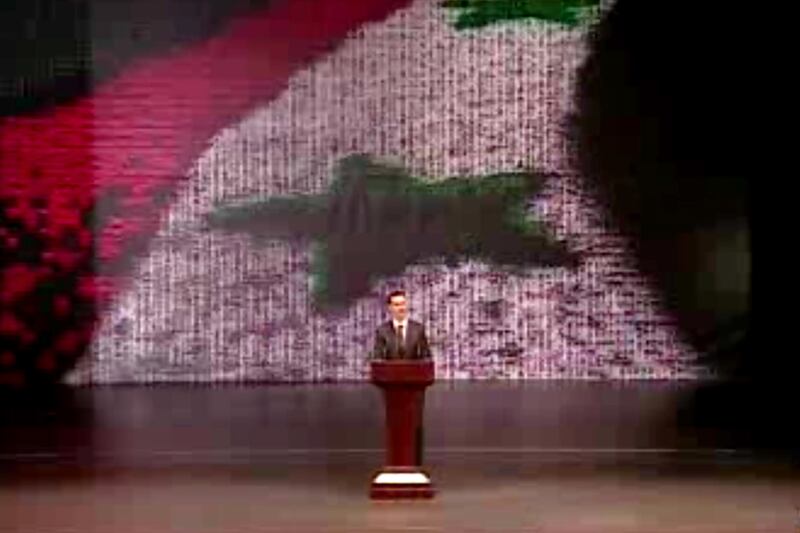
Bashar al-Assad gave a rare speech in Damascus Sunday, and he opened it with an even rarer acknowledgment of the scope of the country’s suffering. But the embattled Syrian president remained as defiant as ever throughout the long and sometimes rambling address, blaming the nation’s ongoing revolution on the work of “criminals,” al Qaeda, and foreign meddling—and vowing once again to keep up the fight. “The West wants us to surrender, but we will never surrender,” Assad said.
Appearing before an audience packed with supporters at the opera house in central Damascus, Assad made his first public speech in six months as violence in Syria continued to rage, on the heels of a week in which his fight against rebels seeking to overthrow him saw government warplanes bomb neighborhoods even in the capital. Assad stood before a collage of images of the war’s many victims—a number that the United Nations estimated at more than 60,000 this week. “Suffering is overwhelming Syrian land,” Assad said as he opened his remarks. “There is no place for joy while security and stability are absent on the streets of our country.”
But Assad refused to take any blame for the spiraling conflict, or to lend legitimacy to the revolution that started as a protest movement in March 2011. Instead, he painted rebels and opposition activists as a combination of terrorists and foreign agents with whom his government could not negotiate. “Is this a revolution of the people? These are a bunch of criminals,” he said.
Assad also sent what appeared to be a pointed rebuttal to the recent international push for a negotiated solution in Syria, which has gained steam amid speculation that Russia, China, and even Iran may be softening in their support of their longtime ally in Damascus. After thanking the three countries by name for what he described as their refusal to intervene in Syria so far, he roundly rejected the idea that a transition plan could be pushed by the international community. “Any foreign initiative has to be in accordance with a Syrian one,” Assad said, in what many commentators read as an angry message to his allies. “Syria accepts advice but not dictation.”
Assad did make an unlikely proposal for a peace initiative of his own, outlining a plan for a national reconciliation conference and the potential for a new constitution. But such talks would be open only to “those who haven’t betrayed Syria,” he said, and the idea appeared unlikely to win the support of Syria’s main opposition groups. In fact, Assad seemed to be limiting his peace process to the state-sanctioned opposition inside Syria instead of the internationally recognized opposition leadership based outside the country.
In the midst of a winter in which rebel forces have pushed deeper than ever into Damascus and enjoyed a string of tactical successes across the country, including the overrunning of key military bases, Assad projected confidence, much to the delight of his audience at the opera house. The crowd occasionally erupted in support, at one point chanting, “God, Bashar, Army, Victory.” Assad was mobbed by supporters as he tried to leave the room.
In his speech, he called on Syrians to fight back against the rebellion, calling for a national “mobilization” in defense of the nation. “We are now in a state of war in every sense of the word,” he said.






